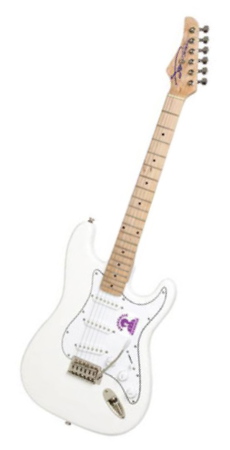Back in blogging mode, and I must apologise to non-guitarist readers, as this is a bit guitar-geeky.
This month’s big guitar news has been the deal between Gibson and Janie Hendrix, sister of the legendary Jimi, and senior honcho at the Authentic Hendrix, the organisation which takes care of the great man’s work and archives. The upshot of all this is a series of three Hendrix signature guitars. Oh look, there’s one of them below…
 Er… right. So it’s not exactly dissimilar to a Fender Stratocaster, really, is it? The offset body shape and simplified headstock shape (have they been taking lessons from John Suhr?) are a little different, but it’s not hard to see the inspiration. And why not? The image of Hendrix with a Strat is one of the most recognisable in the history of rock music.
Er… right. So it’s not exactly dissimilar to a Fender Stratocaster, really, is it? The offset body shape and simplified headstock shape (have they been taking lessons from John Suhr?) are a little different, but it’s not hard to see the inspiration. And why not? The image of Hendrix with a Strat is one of the most recognisable in the history of rock music.
But then, Fender have already invented the Stratocaster, and have continued to manufacture versions of it since 1954, including at least three specific Hendrix tribute models and nostalgic replicas of the off-the-shelf late 1960s models as used by Jimi.
What’s more, the three Gibson models are priced between 250 and 450 US dollars. That’s not just for the guitars, either… each one comes with an amplifier and various multimedia goodies, and the most expensive package also includes a fuzz pedal. This is pretty low-budget stuff, so what’s going on?
For non-guitar readers, perhaps I should explain a little. Much of the history of the electric guitar has been dominated by two American companies, Fender and Gibson. Both played pioneering roles at the start, and both have a generous list of celebrity users, but there’s generally a distinctly identifiable character to the style of each company. Right from the start, Gibson guitars had the look of luxury and classic craftsmanship, while Fender are better known for a modernistic utilitarian look. The boundary has become blurred over time, but there’s still a certain amount of truth in that simplistic summary.
Readers with memories of the 1980s may recall how Coca Cola changed their basic formula, introducing a smoother, sweeter version of Coke in an attempt to reverse a sales slump in comparison with their main rival, Pepsi. The product bombed. Is this the guitar version of New Coke?
It gets worse, too. The price range of these guitars puts them in an area of the guitar market in which Gibson have limited experience, and in which Fender have MASSES of experience. The beginner/budget market is fiercely competitive and dominated by the Fender Strat and interpretations thereof. Can Gibson compete, even with the help of the Hendrix brand? I seriously doubt it, because I suspect most Hendrix fans will not be satisfied with “very similar to a Strat”, even if it does feature Jimi’s signature… they’ll want a Fender Strat.
Furthermore, you have to wonder at the business sense of sister Janie Hendrix… did “her people” even look into the far more appropriate idea of launching this project with Fender? Given the clumsy and misguided zeal with which the Hendrix name has been exploited since he died, I guess not.

Can you hear that grinding, rumbling noise? That’ll be JMH’s subterranean rotational activities…
Hmmm. Four words:
“What were they thinking”
Aghast. Astonished. Crikey. Blimey. Cripes.
Why don’t Gibson stick to what they do well.
Ah, they don’t do anything well these days. Sensible LP and SG reissues would be winners, Juniors etc would sell well.
What do we get? Bonkers ‘special’ editions.
And this travesty.
Again:
“What were they thinking”
Zeb.
I think that the music press should just refuse to review them – that’d help :-)
It’s just another model in a long line of fail – Corvus, Moog RD, V2…
Ah the irony…
I can’t help thinking of Gibson’s lawsuit against PRS over the SingleCut model. Perhaps Fender will sue Gibson over this one. I wonder if the outcome will be the same this time?